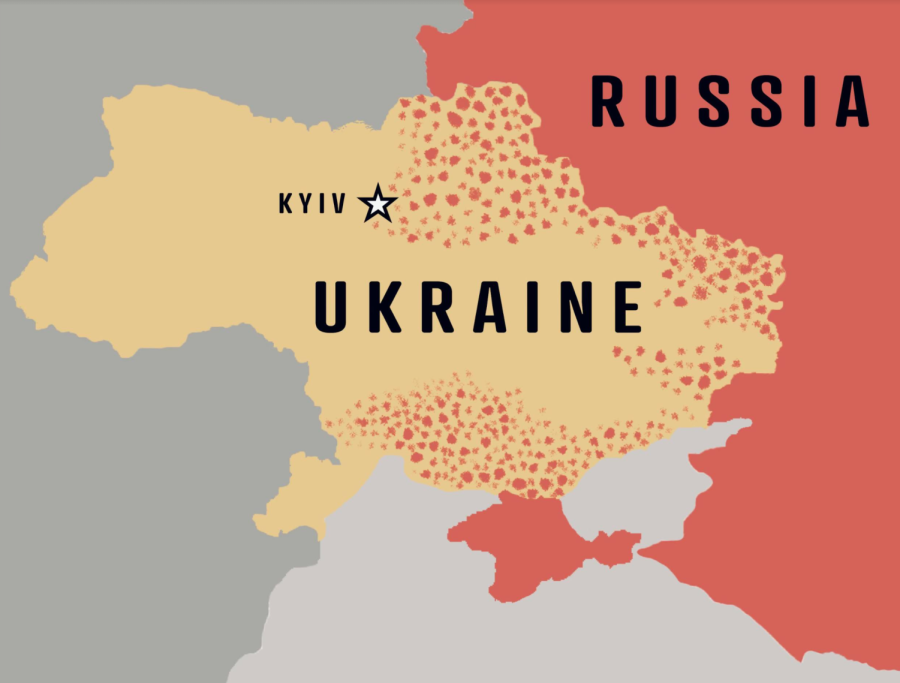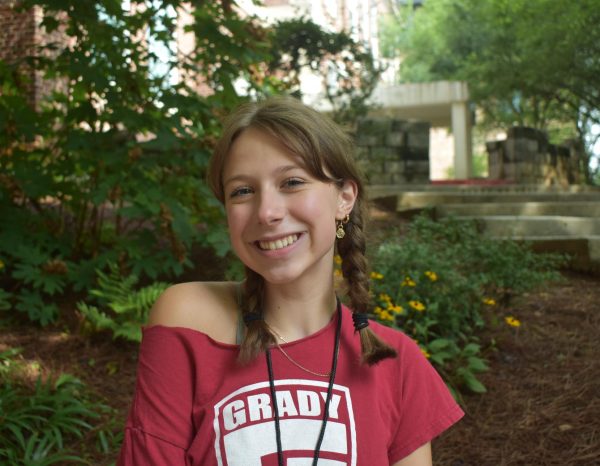Russian invasion of Ukraine escalates, impacts seen across the globe
Since Russia invaded Ukraine, the conflict has escalated prompting response from the international community and causing concern across the world.
March 7, 2022
After months of denials, Russian President Vladimir Putin ordered Russian troops to invade Ukraine. The conflict has escalated as Russian and Ukrainian forces clash and the international community figures out how to respond.
The latest assault is a continuance of a centuries-old conflict between the two former Soviet republics. Ukraine and Russia’s complicated relationship has gotten more complex recently due to the recent tensions surrounding Ukraine’s sovereignty. Senior William Charlop, who has both Ukrainian and Russian heritage, said the current situation is “very worrying”.
“I do have connections to both sides,” Charlop said. “Obviously, I do agree with the Ukrainian side more, but it is just sad to see overall. For example, my family is from the city of Ivano-Frankivsk in western Ukraine and I really wasn’t worried too much because that city is very far from the border, it’s pretty close to the border with Poland. But … there were air raids and the airport there was bombed which was just crazy to me to see, it was very surreal.”
AP Human Geography teacher Chris Wharton said he believes the threat that the North Atlantic Treaty Organization (NATO) poses to Russia is what sparked Putin’s recent interest in the region.
“Ukraine is what’s left that is the closest to Moscow, and I think because of historical reasons and also because Russia does not trust the United States, they don’t trust NATO or any of our allies, that a push for a country like Ukraine becoming closer to western Europe or becoming a part of the European Union or NATO is a threat to Russia,” Wharton said. “So he’s now giving a military response because he feels like he needs Ukraine to at least be under their sphere of control, to feel like they have a buffer zone against NATO and western Europe.”
Russia’s military response has gathered the attention of the entire globe. Protests have broken out across the world in opposition to Russia’s attacks. Charlop said the invasion came as a surprise to him.
“I honestly never thought Russia would do a full-scale invasion of Ukraine like what’s happening right now,” Charlop said. “I thought maybe there might be small skirmishes on the border, like in really eastern Ukraine; I wouldn’t have been shocked by that.”
The day before bombs began to go off in Kyiv, Fox News Correspondent Steve Harrigan, who was reporting from the Ukrainian capital, said many Ukrainians still didn’t believe the invasion would happen.
“I think the people are tough, I think they’re stoic,” Harrigan said. “I see families with their kids still out in the streets, they’re not running away, I think they love their country and they hope for the best. And I think it’s hard to imagine something this bad.”
Because of the resulting turmoil of Russia’s invasion, Wharton said there is bound to be a mass exodus from the war zone that will create constraints on neighboring countries.
“I saw a photo from the news of the highways jammed with cars, people trying to get out of Kyiv, trying to move eastward,” Wharton said. “Neighboring countries are preparing for a potential wave of refugees coming over the borders.”
Wharton predicts that the economic impact of the invasion will be felt past Ukraine’s immediate neighbors.
“Ukraine is really, really resource-rich and I’m sure Russia would like to have control over that. I think some products might become more expensive,” Wharton said. “If Russia starts cutting off their supply of oil and natural gas that could start making demand higher and I think that would impact Europe more than anyplace else.”
To try to prevent more destruction in Ukraine, the United States and its allies have decided to get involved in the conflict by administering economic sanctions against Putin and Russia.
“I think another option, which I would prefer and I think most people would prefer, is that the sanctions really hit Russia,” Charlop said. “There are huge protests going on in Russia too, there’s a bunch of resistance against Putin’s government right now, against the war. So I would really love to see those gain traction and for there to be a peaceful outcome from that.”
Despite these possibilities, Putin still poses a grave threat, and he let the world know by putting his nuclear forces on high alert. Harrigan expressed his concerns about these weapons and what it could mean for the world.
“You basically have one man who controls an entire country and the largest nuclear arsenal in the world,” Harrigan said. “And that man is angry; that man feels his country has been humiliated, that man wants revenge. How are you gonna stop him?”
Russia’s resolution of violence sentences both the Russian and Ukrainian people.
“With Russia too, as angry as I am, the Russian people are victims of a dictatorship and that doesn’t excuse it, but it also gives a level of sympathy,” Charlop said. “It’s just sad to see on both sides, like it’s just so much suffering and I really hope there’s a peaceful resolution.”








